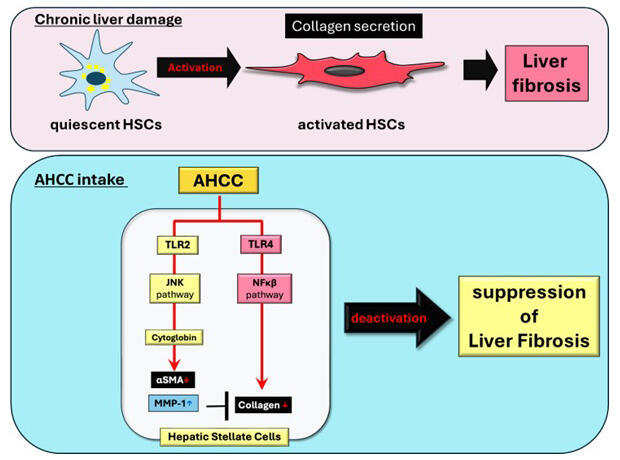Prolonged inflammation in the liver causes liver fibrosis, in which collagen and other fibers accumulate. Hepatitis-related activation of hepatic stellate cells accelerates liver fibrosis, leading to cirrhosis. However, no effective drugs have been found for cirrhosis at present. Thus, it is important to suppress the progression of liver fibrosis as early as possible. Meanwhile, AHCC, an extract preparation from cultured shiitake mushroom (Lentinula edodes) mycelia, is a dietary supplement taken by people in many countries around the world, including Europe, the United States, and Asia. It has been reported to have various effects such as immune activation, mitigation of adverse reactions to anticancer drugs, and hepatoprotection. However, the mechanisms underlying these effects were not well understood.
A joint research group led by Associate Professor Hayato Urushima of the Graduate School of Medicine, Osaka Metropolitan University, and Amino Up has elucidated part of the mechanism of AHCC's effects on hepatic stellate cells and liver fibrosis. The study was published as an advanced online publication in the American Journal of Physiology-Gastrointestinal and Liver Physiology.

Provided by Osaka Metropolitan University
In this study, model mice that had been intraperitoneally administered carbon tetrachloride to induce liver fibrosis were divided into two groups receiving distilled water or AHCC. The effects of AHCC on the progression of liver fibrosis were analyzed. The results showed a decrease in the amount of collagen in the liver and suppression of the progression of liver fibrosis in the AHCC-treated group. The AHCC-treated mice also showed an increase in cytoglobin expression, a known antifibrotic protein, and decreases in the expression of αSMA and HSP47, markers of activated hepatic stellate cells. Further mechanistic analysis using the human hepatic stellate cell line HHSteC revealed that AHCC regulated cytoglobin and αSMA via the TLR2-SAPK/JNK pathway and collagen production via the TLR4-NFκβ pathway.
Urushima said, "The liver is a silent organ, and symptoms often appear only after the pathological condition has progressed considerably. It is important to proactively undergo health checkups to detect liver fibrosis at an early stage and to improve lifestyle habits. Moving forward, we will aim at clinical trials to confirm the effects of AHCC in patients with liver fibrosis to build more reliable scientific evidence."
Journal Information
Publication: American Journal of Physiology-Gastrointestinal and Liver Physiology
Title: AHCC inhibited hepatic stellate cells activation by regulation of cytoglobin induction via TLR2-SAPK/JNK pathway and collagen production via TLR4-NF-κβ pathway
DOI: 10.1152/ajpgi.00134.2024
This article has been translated by JST with permission from The Science News Ltd. (https://sci-news.co.jp/). Unauthorized reproduction of the article and photographs is prohibited.




